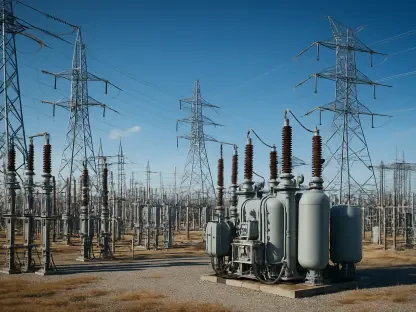With the global energy landscape constantly evolving, the quest for more efficient and sustainable energy storage solutions has become increasingly urgent. A significant player emerging in this field is organic flow battery technology, poised to become a formidable contender against the well-established lithium-ion batteries primarily produced in China. As the world seeks to reduce its reliance on Chinese manufacturing and diversify its energy storage options, the potential of organic flow batteries has garnered considerable attention. These innovative batteries, championed by companies like XL Batteries, are not only designed to enhance energy efficiency but also aim to overcome existing supply chain challenges.
The Strategic Advantage of Organic Flow Batteries
Understanding Organic Flow Technology
Organic flow batteries represent a pivotal advancement in energy technology, utilizing water-based solutions rather than traditional vanadium electrolytes. By harnessing petrochemical feedstocks, these batteries offer an alternative that is both scalable and less reliant on Chinese resources. Unlike lithium-ion batteries, which depend heavily on finite and geographically concentrated materials, organic flow batteries are constructed from abundant and widely distributed petrochemical sources. This strategic advantage reduces the geopolitical risks and supply chain vulnerabilities currently faced by many countries dependent on lithium imports.
The mechanics of organic flow batteries revolve around their modular design and chemical properties. These batteries store energy in liquid form, held in external tanks, which allows for easy scalability depending on the energy storage needs. This flexibility contrasts sharply with the limitations of solid-state lithium-ion counterparts and positions organic flow batteries as viable solutions for both large-scale industrial applications and smaller commercial uses. By facilitating longer lifespans and greater safety due to the non-corrosive nature of their electrolyte solutions, these batteries address two major concerns associated with current lithium battery technology.
Impacts on the Lithium-Dominated Market
The introduction of organic flow batteries could significantly disrupt the lithium-dominated energy market. Currently, China holds an overwhelmingly dominant position, controlling a significant portion of the global lithium supply chain. This monopoly has led to concerns over pricing, supply stability, and economic leverage, prompting nations to seek alternatives. Recent geopolitical tensions have exacerbated these challenges, highlighting the need for diverse and decentralized energy solutions.
XL Batteries, under the leadership of CEO Tom Sisto, seeks to capitalize on these market dynamics by presenting organic flow batteries as a strategic alternative. Sisto’s approach is informed by historical lessons drawn from the U.S. struggles to establish its own lithium battery industry, coupled with past missteps that allowed Chinese interests to acquire significant American battery assets. With organic flow batteries, the emphasis is on domestic production capabilities and the development of expertise to circumvent obstacles that previously thwarted efforts in the lithium sector.
Overcoming Economic and Technical Hurdles
Addressing Cost Barriers
Cost has always been a critical consideration in the adoption of any new technology. For organic flow batteries to gain widespread acceptance, they must overcome the financial challenges that have plagued other similar technologies, such as vanadium flow batteries. One significant advantage of transitioning to organic flow batteries is the reduction in material costs. By eliminating the need for vanadium and embracing petrochemical alternatives, production becomes more economically viable.
The financial landscape is also favorable due to the increasing tariffs on Chinese goods, which have inflated the costs of lithium battery projects. These economic pressures have spurred the exploration of new technological directions, making previously overlooked alternatives far more appealing. Organic flow batteries offer a solution that not only aligns with current fiscal realities but also provides an opportunity to establish more resilient local production lines, reducing dependency on foreign imports.
Technical Milestones and Challenges
From a technical standpoint, the development and deployment of organic flow batteries hinge on overcoming several key challenges. Achieving efficient energy storage and energy density while maintaining safety and reducing environmental impact are critical to their success. Importantly, advancements in organic chemistry have enabled the tweaking of compounds to enhance storage efficiency, lifecycle, and performance, bringing these batteries closer to commercial viability.
The path to widespread adoption involves rigorous testing and demonstration projects to establish trust in the technology. By 2030, XL Batteries aims to commercialize its organic flow battery solution, positioning it as a mainstream option in the energy market. This anticipated launch timeline underscores the sustained research and development efforts required to refine the technology and address lingering technical hurdles. Continued investment and support for innovation are crucial for these batteries to transition from laboratory experiments to everyday practical applications.
Future Perspectives on Energy Independence
Implications for National Energy Strategies
In a world increasingly focused on energy independence and sustainability, organic flow batteries emerge as potential game changers. Their deployment could offer countries a path to energy autonomy, reducing reliance on a single dominant nation for supply and enabling more balanced geopolitical relations. This shift could parallel recent movements seen in Europe as nations sought alternatives during energy crises, reflecting a broader global trend toward diversification in energy sourcing.
Moreover, organic flow batteries present a compelling opportunity for developing nations that might not have access to abundant lithium reserves. By leveraging widely available petrochemical feedstocks, these countries can bolster their energy infrastructure and participate more actively in the global energy market. This democratization of energy technology might lead to regional innovation hubs, fostering collaboration and healthy competition, ultimately driving prices down and availability up.
Moving Towards a Sustainable Future
With the ever-evolving global energy landscape, the need for more efficient and sustainable energy storage solutions is becoming increasingly critical. A key player emerging on this front is organic flow battery technology, which stands as a strong contender against the long-established lithium-ion batteries largely manufactured in China. As the world endeavors to lessen its reliance on Chinese production and broaden its energy storage solutions, the potential of organic flow batteries is attracting significant interest. Unlike conventional options, these revolutionary batteries, endorsed by companies like XL Batteries, are crafted not only to boost energy efficiency but also to address and potentially resolve prevailing supply chain issues. With the focus shifting towards cleaner and more accessible energy alternatives, organic flow batteries could play a crucial role in moving towards a more sustainable future, helping nations reach their energy goals while reducing carbon footprints and providing reliable storage solutions.









